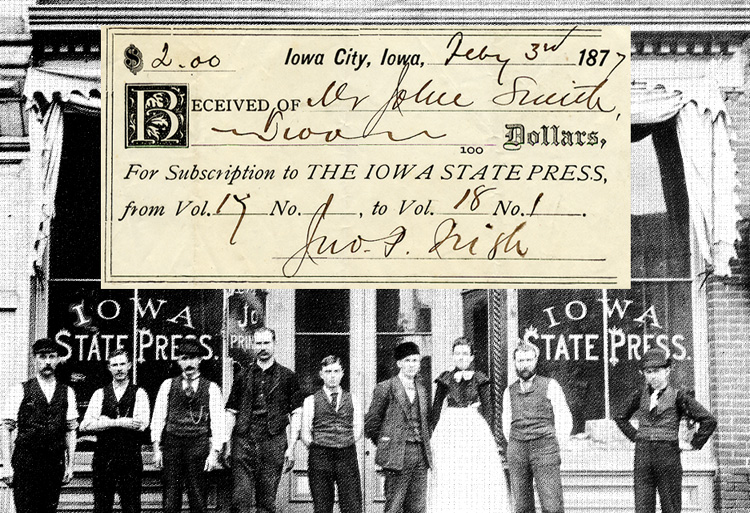
The
1894 Iowa State Press, a forerunner of today’s Press-Citizen, was located on
what is now part of the
Plaza Center One site downtown. The $2 receipt from the author’s collection
for a year’s subscription is signed
by colorful early publisher John Irish in 1877, the year he was an
unsuccessful Iowa gubernatorial candidate.
|
By
Bob Hibbs
“Almost
everyone who isn’t drunk is getting rich” in 1857 Iowa City, wrote noted
publisher Horace Greeley in his New
York Tribune.
The
remark came after nearly two decades of growth as Iowa’s capital city, first
of the territory from the city’s founding in 1839 until the State of Iowa
came into being in 1846, then as state capital until that title was assumed by
Des Moines in December of the year in which Greeley issued his colorful
characterization of the frontier town.
Greeley
contributed toward construction of a local church, so perhaps he wanted to
help save all those sinners.
His
comment offers insight into typical newspaper style of the era – gross
generalizations, exuberant advocacy on partisan issues, and sharply-worded
attacks on perceived enemies. As papers perished, survivors evolved into more
impartial news reports for the entire community, with opinions presented on
specified pages, as exist today.
Modern
TV news attempts the same factual presentation, except for Fox cable
channel’s adoption of Europe’s advocacy style which its Australian owner
Ruppert Murdock adapted from home and England.
Iowa
City pioneers briefly had the choice of three newspapers. The Iowa
City Argus was first published in August 1841, but died a few months
later.
Existing
much longer were the Iowa City Standard
– Whig in politics, first printed June 10, 1841 – and the Iowa
Capital Reporter, a Democrat Party paper first printed Dec. 4, 1841. The Standard
evolved into the Iowa City Republican
after the birth of the Iowa GOP in Old Capitol in 1856 and survived into the
early 20th century.
The
Reporter grasp economic survival in
the state’s early printing contract. The paper was a partnership between
Thomas Hughes and Gen. Verplanck Van Antwerp, who was appointed in 1838 to the
U.S. Land Office in Burlington.
Hughes,
who had worked in newspaper offices in Davenport, Burlington and Dubuque,
began publication of the Bloomington
Herald in Muscatine in 1840. He and Van Antwerp looked to the new
territorial capital for their joint venture, first printing just days before
the initial legislative session was convened in Iowa City Dec. 6, 1841.
Ten
months later, Jesse Williams bought out Van Antwerp, and in 1844 purchased the
Hughes interest, too. Hughes later was elected a state legislator, served as
Iowa City clerk and as Johnson County treasurer, a position he held at the
time of his death in 1881.
The
Reporter, housed on a site now
serving Newman Catholic Student Center, was allowed to die in 1860 as the
community abandoned the old Democratic Party in droves over its perceived
pro-slavery stance during a national brouhaha over Kansas and Nebraska
statehood.
It
was remade as the Press, which
evolved into the Iowa State Press,
and in 1904 became the Iowa City Daily
Press. In 1920 it was merged with the Iowa
City Citizen to form today’s only surviving non-student paper.
The
youngest son of prominent Iowa City pioneer Frederick Irish (1801-1875), John
Irish (1843-1923) became editor of the Press
in 1864 at age 22, later purchasing it.
As
a youngster, John had often accompanied his blind father, including on an 1858
lynch mob outing after which the senior Irish and 14 others were charged with
murder. Irish was acquitted.
John
became a legislator as a staunch Democrat, and during service as a trustee of
the University of Iowa, he played an important role in establishment of the
College of Medicine in which he later took great pride.
But,
five years after he lost a bid to be Iowa governor in 1877, he sold his Iowa
City interests and bought the daily paper at Oakland, Calif., which he
converted from Republican to Democrat.
The
medical school has progressed during the years since then; and, the Oakland
paper is now non-partisan.
Next
Saturday: County namesake Richard
Mentor Johnson. Bob Hibbs collects local postcards and researches history related to them.
|